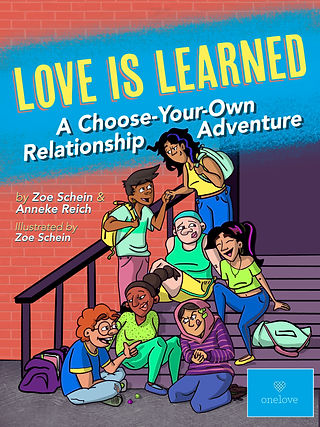
Love is Learned: A Choose-Your-Own Relationship Adventure
One Love Foundation, 2024
Description:
Ari and Ros have been dating for a while, and it's going really well! But when Ros starts using the roller skating gear that Ari bought her for their anniversary to go skating with her other friends - without Ari! - Ari's jealousy threatens to upend their relationship. What should they do?
Natalia and Jo were friends for a long time before they decided to start hooking up. Now, Natalia's realizing her feelings for Jo are more platonic after all - but Jo still seems so into it! How can Natalia tell Jo she just wants to be friends again?
Zach, Bailey, and Zara have been playing Dungeons and Dragons together for a few years. Zara has been their fearless Dungeon Master - she loves to set up puzzles, riddles, and tricks! But Zach's character is a barbarian - and he doesn't have the highest intelligence score. One day, he blows up at Zara - yelling at her that she's rigging the game against him and his character. They're furious at each other - and Bailey is stuck in the middle. Can she help her friends to understand each other? Or will their game group have to go their separate ways?

Clinical Ethics: A graphic Medicine Casebook
Penn State University Press, 2022
Description:
Mr. Ito’s children act as his informal translators, but his doctor isn’t sure their translations are accurate or complete. Is Mr. Ito getting the medical information he needs?
Ten-year-old Hannah arrives for her checkup with a bruised nose and an irritable father. Medical student Melanie is concerned for Hannah’s safety but wary of making accusations without evidence.
Dr. Joshi worries that her patient is putting her husband, who is also Dr. Joshi’s patient, at risk by concealing a sexually transmitted disease. How can she act in the interest of both husband and wife without compromising doctor-patient confidentiality?
Using the accessible and richly layered medium of comics, this collection reveals how ethical dilemmas in medical practice play out in real life. Designed for the classroom, Clinical Ethics provides an excellent introduction to medical ethics and presents case studies that will spark meaningful discussions among students and practitioners. The topics covered include patient autonomy, informed consent, unconscious bias, mandated reporting, confidentiality, medical mistakes, surrogate decision-making, and futility. The “Questions for Further Reflection” and “Related Readings” sections provide additional materials for a deeper exploration of the issues. Co-created by experts in clinical medicine, ethics, literature, and comics, Clinical Ethics presents a new way for students and practitioners to engage with fundamental concerns in medical ethics.
Praise for Clinical Ethics: A Graphic Medicine Casebook
“Clinical Ethics offers an engaging introduction to an array of ethical questions prominently featured in medical ethics classrooms. Graphic scenarios provide individual cases or situations—many based on clinical experience—that highlight the four principles of medical ethics. The scenarios speak to one another, enhancing students’ inquiry and understanding of the challenges of ethics, which raises questions rather than providing answers.”
—Ellen Feder, author of Family Bonds: Genealogies of Race and Gender
"Unlike most ethics texts that tend to present cases using an omniscient point of view and detached narrator, passive voice, and the veneer of objectivity, the cases in this book unabashedly reveal a point of view, often showing multiple perspectives via thought bubbles, narrations, and depictions of body language and facial expressions. All this adds narrative depth to the case basics, helping the reader understand the ethical dilemma not only intellectually, but also affectively, by 'feeling' its weight and burdens. The book is groundbreaking in how it uses comics to challenge, provoke, and education about ethical issues in the clinical arena."
—Dr. Michael J. Green, in "Graphic Medicine - the Best of 2022"

"Banking Blood"
Annals of Internal Medicine,
February 2023
Blood bank director Dr. Carrie Tootsworth must weigh competing bids for blood products, while making sure to maintain a stockpile in the case of unforeseen emergencies. How will she navigate the difficult decisions she must make to fairly and ethically distribute a medical resource that's already in short supply?
The Book of Thesis Books
Rhode Island School of Design, 2018

"This guide is intended to help future thesis writers understand the range of approaches to and content in RISD thesis books, locate some especially strong examples in the Library's vast thesis collection, and imagine and plan their own theses." - from the Introduction by Jennifer Liese
Excerpt:
"Schein's thesis is as compelling for its playful interventions into the form of the academic research paper as it is for its content, which makes perfect sense given [their] project: to integrate queer theory and arts-based research toward inventing a 'counter hegemonic knowledge practice.' Faithfully enacting academic writing norms, Schein integrates sources drawn from a thorough literature review (from Foucault to bell hooks), carefully defines [their] key terms, and presents persuasive arguments."

